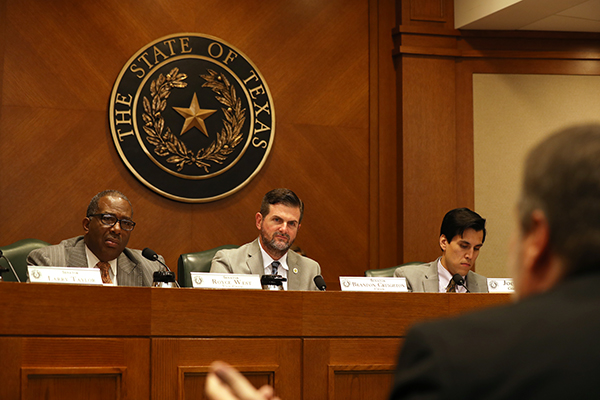State legislators are trying to ensure transfer students get credit for courses they’ve already taken and graduate in four years.
At UT, 15 percent of new undergraduate students were transfers in fall 2018, according to the Institutional Reporting, Research and Information Systems.
State Sen. Royce West, D-Dallas, outlined two bills at the Senate Committee on Higher Education meeting Wednesday that seek to improve the credit transfer process.
Of the 42 semester credit hours that make up the Texas common core curriculum, only 12 are consistently required and accepted state-wide for all undergraduate degree plans, West said.
“(Students, parents and advisors) expect that the 42 semester credit hours and transfer work will not only satisfy state requirements, but will also apply to a student’s degree plan,” West said. “Yet, 30 semester credit hours of course work within the core can vary considerably among universities and even among various disciplines within each university.”
West said all 42 semester credit hours of the core curriculum should apply consistently to all degrees at all institutions across the state. West said his bills, Senate Bill 1923 and Senate Bill 25, aim to accomplish that by creating transfer pathways at universities and simplifying the common core curriculum, respectively.
“The restructuring of the common core would be done by breaking it into two components — the general core and the disciplinary core,” West said. “The general core would transfer and apply to all degrees and consist of half of the 42 hours that exist in the current common core. The second portion would be the disciplinary core that would be comprised of meta majors.”
Meta majors are clusters of courses required by similar majors in an area of study. West said creating meta major pathways would help streamline students’ selection of courses for their academic and career interests. The meta major pathways, proposed in SB-1923, would also transfer across all institutions in Texas, West said.
SB-25 would also require four-year institutions to establish agreements with some lower-division institutions, enabling students to receive up to 60 hours of transfer credit.
“These reforms would dramatically increase predictability and consistency for Texas students about which courses are transferable and applicable to degree requirements,”
West said.
Sen. Kel Seliger, R-Amarillo, proposed an additional bill that requires institutions to report their reasoning for not accepting certain transfer credits to the Texas Higher Education Coordinating Board.
“SB 502 requires institutions to report to the Higher Education Coordinating Board how many credits they do not accept from a transferring institution and explain why the transferred credit was not accepted,” Seliger said. “It is up to the university to be the arbiter of those academic credits that apply to the university, but the information ought to be available to the people trying to transfer to the university.”
Sen. José Menéndez, D-San Antonio, explained his bill, SB 2058, would require universities that do not accept a transfer credit to absorb the cost of the tuition and fees for the substitute course the student has
to take.
“I’d like to shift the burden of additional classes due to nonaccepted credits to the receiving institution and not the students because we are all working so hard to lower their student debt,” Menéndez said.
All four bills were left pending in committee to be readdressed at a later time.





















